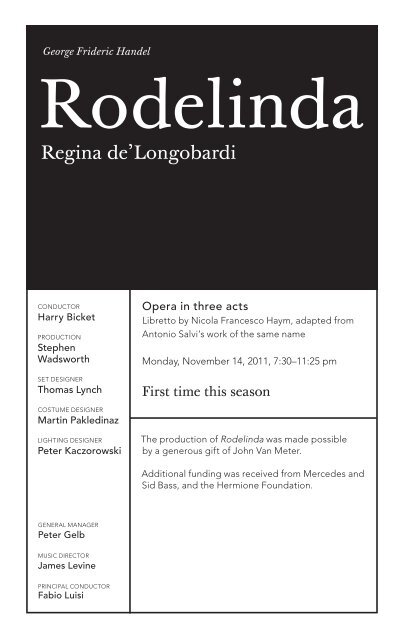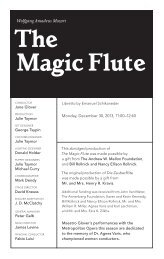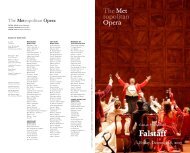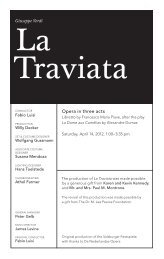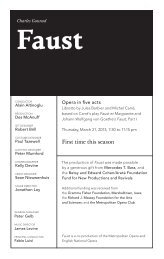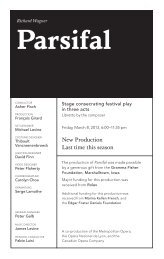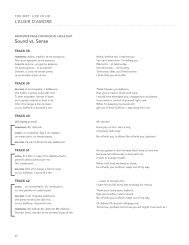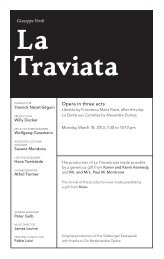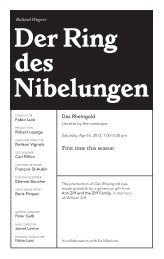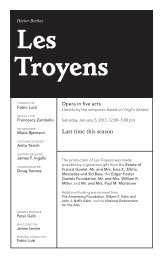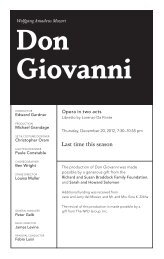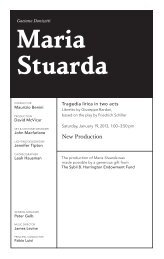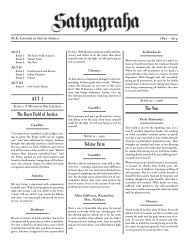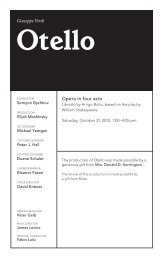Rodelinda - Metropolitan Opera
Rodelinda - Metropolitan Opera
Rodelinda - Metropolitan Opera
Create successful ePaper yourself
Turn your PDF publications into a flip-book with our unique Google optimized e-Paper software.
George Frideric Handel<br />
<strong>Rodelinda</strong><br />
Regina de’Longobardi<br />
CONDUCTOR<br />
Harry Bicket<br />
PRODUCTION<br />
Stephen<br />
Wadsworth<br />
SET DESIGNER<br />
Thomas Lynch<br />
COSTUME DESIGNER<br />
Martin Pakledinaz<br />
LIGHTING DESIGNER<br />
Peter Kaczorowski<br />
GENERAL MANAGER<br />
Peter Gelb<br />
MUSIC DIRECTOR<br />
James Levine<br />
PRINCIPAL CONDUCTOR<br />
Fabio Luisi<br />
<strong>Opera</strong> in three acts<br />
Libretto by Nicola Francesco Haym, adapted from<br />
Antonio Salvi’s work of the same name<br />
Monday, November 14, 2011, 7:30–11:25 pm<br />
First time this season<br />
The production of <strong>Rodelinda</strong> was made possible<br />
by a generous gift of John Van Meter.<br />
Additional funding was received from Mercedes and<br />
Sid Bass, and the Hermione Foundation.
This performance<br />
is being broadcast<br />
live on <strong>Metropolitan</strong><br />
<strong>Opera</strong> Radio on<br />
SiriusXM channel 74<br />
and streamed at<br />
metopera.org.<br />
2011–12 Season<br />
The 15th <strong>Metropolitan</strong> <strong>Opera</strong> performance of<br />
George Frideric Handel’s<br />
<strong>Rodelinda</strong><br />
Regina de’Longobardi<br />
conductor<br />
Harry Bicket<br />
cast in order of appearance<br />
<strong>Rodelinda</strong>, Queen of Milan, wife of Bertarido<br />
Renée Fleming<br />
Grimoaldo, usurper of Milan, betrothed to Eduige<br />
Joseph Kaiser<br />
Garibaldo, counselor to Grimoaldo<br />
Shenyang *<br />
Eduige, Bertarido’s sister, bethrothed to Grimoaldo<br />
Stephanie Blythe *<br />
Bertarido, King of Milan, believed to be dead<br />
Andreas Scholl<br />
Unulfo, counselor to Grimoaldo, secretly loyal<br />
to Bertarido<br />
Iestyn Davies DEBUT<br />
Flavio, son of <strong>Rodelinda</strong> and Bertarido<br />
Moritz Linn<br />
continuo:<br />
Harry Bicket, harpsichord recitative<br />
Bradley Brookshire, harpsichord ripieno<br />
David Hess, cello<br />
Daniel Swenberg, theorbo, lute, and baroque guitar<br />
Monday, November 14, 2011, 7:30–11:25 pm
Renée Fleming in the<br />
title role of Handel’s<br />
<strong>Rodelinda</strong><br />
Yamaha is the official piano<br />
of the <strong>Metropolitan</strong> <strong>Opera</strong>.<br />
Latecomers will not be<br />
admitted during the<br />
performance.<br />
* Graduate of the<br />
Lindemann Young Artist<br />
Development Program<br />
Visit metopera.org<br />
Fight Director Steve Rankin<br />
Musical Preparation Donna Racik, Dan Saunders,<br />
J. David Jackson, Bradley Brookshire<br />
Assistant Stage Directors Gina Lapinski, Louisa Muller<br />
Prompter Donna Racik<br />
Met Titles Cori Ellison<br />
Italian Coach Hemdi Kfir<br />
Assistant to the Set Designer Charles Corcoran<br />
Assistant to the Costume Designer Elena Shura<br />
Pollatsek<br />
Scenery, properties and electrical props constructed<br />
and painted in <strong>Metropolitan</strong> <strong>Opera</strong> Shops<br />
Costumes executed by <strong>Metropolitan</strong> <strong>Opera</strong> Costume<br />
Department<br />
Wigs by <strong>Metropolitan</strong> <strong>Opera</strong> Wig Department<br />
Animals supervised by All-Tame Animals, Inc.<br />
This performance is made possible in part by public funds<br />
from the New York State Council on the Arts.<br />
Edited for the Händel Complete Critical Edition by Andrew V. Jones;<br />
and used by arrangement with European American Music Distributors<br />
LLC, sole U.S. and Canadian agent for Bärenreiter Verlag, publisher and<br />
copyright owner.<br />
Before the performance begins, please switch off cell phones<br />
and other electronic devices.<br />
Met Titles<br />
To activate, press the red button to the right of the screen in front of<br />
your seat and follow the instructions provided. To turn off the display,<br />
press the red button once again. If you have questions please ask an<br />
usher at intermission.<br />
Ken Howard/<strong>Metropolitan</strong> <strong>Opera</strong>
38<br />
Synopsis<br />
The royal palace in Milan and the surrounding countryside, early 18th century<br />
Act I<br />
scene 1 A room in the palace<br />
scene 2 At Bertarido’s memorial<br />
Intermission (at APPROXIMATELY 8:20 PM)<br />
Act II<br />
scene 1 The palace library<br />
scene 2 Outside the stables<br />
Intermission (at APPROXIMATELY 9:45 PM)<br />
Act III<br />
scene 1 At Bertarido’s memorial<br />
scene 2 A prison cell<br />
scene 3 At Bertarido’s memorial<br />
scene 4 The palace library<br />
Bertarido, King of Lombardy and Milan, has been deposed by Grimoaldo and is<br />
presumed dead, while his queen, <strong>Rodelinda</strong>, and their young son, Flavio, have<br />
been left behind. Grimoaldo is engaged to Bertarido’s sister, Eduige. Marrying<br />
her would grant him a legitimate claim to the throne, but she has so far resisted<br />
his attempts, claiming she is still mourning her brother. Meanwhile Bertarido,<br />
who spread the rumor of his own death to gain time, plans to return to Milan in<br />
disguise to rescue his wife and son. Grimoaldo, resolved to become king, weighs<br />
his options, counseled by his confidant, Garibaldo, and Unulfo, a member of<br />
Bertarido’s cabinet who is the only person who knows that Bertarido lives.<br />
Act I<br />
<strong>Rodelinda</strong> and her son are being held in the palace in Milan. When Grimoaldo<br />
announces his wish to marry her instead of Eduige, thereby gaining the throne,<br />
the outraged <strong>Rodelinda</strong> refuses him. Eduige is appalled by Grimoaldo’s<br />
behavior and reminds him of his vow, but he, though still in love with her, rejects<br />
her. Furious, and encouraged by a declaration of love from Garibaldo, Eduige<br />
resolves to see Grimoaldo brought down. Garibaldo reveals that he is merely<br />
using Eduige to further his own ambitions for the throne.<br />
Disguised as a soldier, Bertarido arrives at the memorial built in his honor. His<br />
reunion with the loyal Unulfo is interrupted by the appearance of <strong>Rodelinda</strong><br />
and Flavio. Bertarido and Unulfo hide. Garibaldo arrives with an ultimatum from
Grimoaldo: if <strong>Rodelinda</strong> refuses to marry the usurper, her son will die. Defeated,<br />
<strong>Rodelinda</strong> is forced to agree. Bertarido is dismayed at her apparent betrayal.<br />
Act II<br />
At the palace, Garibaldo reveals Grimoaldo’s marriage plans to Eduige. He again<br />
offers his services in exchange for her hand but realizes from her response that<br />
she may still be in love with Grimoaldo. <strong>Rodelinda</strong> appears and reassures Eduige<br />
that her son’s future is her greatest concern. Eduige wonders how <strong>Rodelinda</strong><br />
can accept the traitor Grimoaldo’s hand. Her love for him has turned to hate.<br />
<strong>Rodelinda</strong> now presents Grimoaldo with an ultimatum of her own: she will marry<br />
him if he personally kills her son before her eyes—she can never be the wife<br />
of a usurper while still the mother of a rightful king. Her gamble works and<br />
the shocked Grimoaldo backs down. Garibaldo considers what he sees as the<br />
usurper’s weakness and states that power must be seized and ensured at any<br />
cost. Unulfo resolves to tell Bertarido of his wife’s fidelity.<br />
Eduige meets the wandering Bertarido, overjoyed to find him alive. Unulfo<br />
assures Bertarido that <strong>Rodelinda</strong> has not betrayed him, while Eduige promises<br />
to help him rescue his family. Unulfo goes off and returns with <strong>Rodelinda</strong>. The<br />
reunion of husband and wife is interrupted by the appearance of Grimoaldo.<br />
Never having seen Bertarido, he is enraged to find <strong>Rodelinda</strong> with what he thinks<br />
is a lover. Bertarido reveals his identity, but <strong>Rodelinda</strong>, ready to sacrifice her<br />
reputation to save his life, says he is lying. Grimoaldo declares that whoever his<br />
rival may be, he will die. He leaves the couple to say their final goodbye.<br />
Act III<br />
Eduige and Unulfo plan Bertarido’s escape from prison and Eduige wonders if<br />
this good deed can undo her previous crimes. Garibaldo advises Grimoaldo to<br />
kill Bertarido right away, but Grimoaldo hesitates, caught between feelings of<br />
fear, suspicion, love, and remorse.<br />
The imprisoned Bertarido finds a weapon dropped through the bars of his cell.<br />
Hearing someone approaching, he strikes out at the intruder—who turns out<br />
to be Unulfo. Though wounded, Unulfo manages to get Bertarido out by a<br />
secret exit. <strong>Rodelinda</strong>, who arrives with Eduige to rescue her husband, finds only<br />
Unulfo’s bloodstained coat and fears the worst.<br />
Grimoaldo is still tormented by his crimes. Garibaldo is about to assassinate the<br />
sleeping usurper when Bertarido appears and kills Garibaldo. He then challenges<br />
Grimoaldo to take his revenge on his rescuer. Unulfo and Eduige enter and<br />
confess their part in Bertarido’s escape. In gratitude, Grimoaldo restores wife,<br />
child, and throne to the rightful king and renews his promise of marriage to<br />
Eduige, who forgives him. All celebrate the prospect of a happier future.<br />
Visit metopera.org<br />
39
If the Met has<br />
played a role in<br />
your past...<br />
Encore Society<br />
Milka Ternina as Brünnhilde in Die Walküre, 1899<br />
Photo: Courtesy of the MetroPolitan oPera arChives<br />
...play a role in<br />
its future.<br />
Support the Met far into<br />
the future by including the<br />
company in your will. It’s<br />
one of the greatest gifts<br />
you can give—the gift of<br />
beautiful music and a legacy<br />
of great opera.<br />
for information about making<br />
a bequest to the Met, please<br />
call 212.870.7388 or email<br />
encoresociety@metopera.org.<br />
Deborah Voigt as Brünnhilde in Die Walküre, 2011<br />
Photo: Ken howard/MetroPolitan oPera
In Focus<br />
George Frideric Handel<br />
<strong>Rodelinda</strong><br />
Premiere: London, King’s Theatre, 1725<br />
One of Handel’s most successful operas in its day and one of his most highly<br />
regarded in recent times, <strong>Rodelinda</strong> is an involving, taut, and remarkably modern<br />
drama. The story revolves around the unshakeable love of the title character, a<br />
queen who remains true to her husband’s memory despite his reported death<br />
and while being courted by political and emotional usurpers. Much of the<br />
opera’s power lies in the appeal of its protagonist, a realistic portrait of a woman<br />
rather than an allegorical type. The other characters are equally well drawn in<br />
both words and music: Grimoaldo presses <strong>Rodelinda</strong> for marriage to legitimize<br />
his seizure of the country, but he is far from a stock villain and can act with honor;<br />
the dethroned Bertarido (a role originally written for castrato, sung at the Met by<br />
a countertenor), is an ideal yet entirely believable representation of a devoted,<br />
loving husband; his sister, Eduige, struggles to find her place in a changing<br />
society. Every character is driven by dramatically credible motivations and the<br />
human emotions that accompany them, all masterfully captured in Handel’s<br />
music, which is by turns subtle and bold.<br />
The Creators<br />
George Frideric Handel (1685–1759) was born in Germany, trained extensively in<br />
the music capitals of Italy, and spent most of his brilliant career in London. While<br />
his great choral and orchestral works—most notably Messiah and the Music for<br />
the Royal Fireworks—have remained extraordinarily popular up to the present<br />
day, his theatrical creations, which were instrumental in introducing Italian<br />
opera to the British public, disappeared from the world’s stages for almost two<br />
centuries. The modern Handel revival began with a production of <strong>Rodelinda</strong> in<br />
Göttingen, Germany, in 1920. During the later decades of the 20th century, a<br />
widespread reassessment of his operas brought these works to the attention of<br />
contemporary audiences. Nicola Francesco Haym (1678–1729) was a librettist<br />
as well as a theater manager, a cellist, and a composer in his own right. Born in<br />
Rome of German parents, he settled in England in 1701. He wrote the librettos<br />
for several of Handel’s greatest operas, including Tamerlano and Giulio Cesare<br />
(both in 1724).<br />
41
42<br />
In Focus CONTINUED<br />
The Setting<br />
The story takes place in and around Milan, the capital of the northern Italian<br />
kingdom of Lombardy. This production moves the action from its original early<br />
medieval setting in the 7th century to Handel’s own time.<br />
The Music<br />
The orchestra for <strong>Rodelinda</strong>, as for Baroque opera in general, is quite small by<br />
today’s standards—a total of 40 instrumentalists, including recorders, theorbo (a<br />
specific kind of bass lute), and harpsichord. Handel creates remarkable effects<br />
with this ensemble, both independently and as accompaniment for the singers.<br />
The evocation of nature in the second scene of Act I is particularly atmospheric.<br />
According to the dramatic conventions of 18th-century opera seria, action<br />
and plot development are found in the harpsichord-accompanied recitatives,<br />
while solo arias are the primary mode of emotional expression. The mood of<br />
the characters’ reflections ranges from lamenting (Bertarido’s “Dove sei?”) to<br />
scheming (Eduige’s “De’ miei scherni per far le vendette,” full of modulations<br />
between major and minor keys) to furious (the lead soprano’s “Morrai, sì, l’empia<br />
tua testa”). Handel achieves an extraordinary degree of drama and contrast<br />
within this framework, which is broken in only a few instances, most notably<br />
in the duet for <strong>Rodelinda</strong> and Bertarido (“Io t’abraccio”) that concludes the<br />
second act. The loving husband and wife, who had seemingly lost each other<br />
forever, are briefly reunited before they must separate again. With its descending<br />
chain of dissonances and resolutions, the music captures two people in awe of<br />
a moment in time that paradoxically holds both fulfillment and loss. Removed<br />
from context, the duet is among the highlights of Handel’s musical output.<br />
Preceded by Grimoaldo’s explosive aria of anger and vengeance, “Tuo drudo è<br />
mio rivale,” which in itself comes at the end of an entire act filled with longing<br />
and expectation, it becomes a dramatic masterstroke as well.<br />
<strong>Rodelinda</strong> at the Met<br />
The opera had its Met premiere in the current production by Stephen Wadsworth<br />
on December 2, 2004, with Renée Fleming in the title role opposite Stephanie<br />
Blythe, David Daniels, Kobie van Rensburg, and John Relyea, with Harry Bicket<br />
conducting. It was revived in 2006.<br />
Visit metopera.org
PHOTO: KEN HOWARD/METROPOLITAN OPERA<br />
“A profound and beautiful<br />
work of theater.”<br />
—The Washington Post<br />
Don’t miss the sold-out<br />
hit of 2008, Philip Glass’s<br />
unforgettable opera about<br />
Gandhi’s heroic journey.<br />
Philip Glass<br />
SATYAGRAHA<br />
Starring RICHARD CROFT<br />
Directed & Designed by<br />
PHELIM MCDERMOTT & JULIAN CROUCH<br />
NOV 4, 8, 12 eve, 15, 19 mat, 26 mat DEC 1<br />
metopera.org | 212-362-6000<br />
“Hypnotic<br />
visual and<br />
musical magic”<br />
—Wall Street Journal
44<br />
Program Note<br />
Handel’s operas are no longer a rarity: they figure regularly in the<br />
repertory of companies great and small. It is strange to think that for<br />
nearly two centuries these great works went unheard—indeed, were<br />
almost unknown. The Handel opera revival began in Göttingen, Germany, in<br />
1920, and it began with <strong>Rodelinda</strong>. Art historian (and amateur musician) Oskar<br />
Hagen perceived that a score once deemed a string of excellent da capo arias<br />
was in fact a music drama that could engage a modern audience. His enterprise<br />
was rewarded: within six years, <strong>Rodelinda</strong> had been taken up by 25 other<br />
German-language companies. Hagen’s version of Giulio Cesare, two years later,<br />
was even more successful and seen in 45 theaters.<br />
Outside Germany, Handel was slower to make his modern mark. The operas<br />
were left to local champions. Smith College gave the U.S. premieres of Giulio<br />
Cesare in 1927 and <strong>Rodelinda</strong> in 1931, both in English translations. In 1939,<br />
<strong>Rodelinda</strong> had its first London performances since 1731 at the Old Vic, presented<br />
by the music theater and art departments of the Dartington Hall academy.<br />
Handel first arrived in London in 1710 at age 25. The following year his<br />
Rinaldo, the first Italian opera composed for London, was heard at the Queen’s<br />
Theatre—and brought the composer the same kind of success that he had<br />
enjoyed in Venice a little more than a year earlier with Agrippina. He returned<br />
to his post as kapellmeister to the elector in Hanover in June 1711 but was back<br />
in London the next year and remained there for the rest of his life, acquiring<br />
British nationality in 1727. He composed more than 30 operas for the London<br />
stage, the last of them, Deidamia, in 1741. It ran for only three performances.<br />
London was losing its taste for Italian opera and Handel turned to “musical<br />
dramas” set to English librettos. They were performed at Covent Garden or the<br />
King’s Theatre “after the manner of an oratorio” (according to a contemporary<br />
advertisement for Semele), but in recent years have often been staged. Notable<br />
examples include Semele, Saul, Samson, Hercules, Theodora, and Jephtha.<br />
In 1720 a group of noble enthusiasts, under royal patronage, had founded<br />
the Royal Academy of Music at the King’s Theatre—not a teaching establishment<br />
but an attempt to institute Italian opera in London on a long-term, regular<br />
basis. Handel was its music director and principal (though not only) composer.<br />
The year before, he had traveled to the continent, recruiting singers for the<br />
new company. The great castrato Senesino joined the academy in its second<br />
season, and the brilliant soprano Francesca Cuzzoni arrived late in 1722. London<br />
became—as the musicologist Winton Dean put it—“the operatic center of<br />
Europe, with the best composers, the best singers, and creditable scenic<br />
designers.” The academy reached a peak with the three successive hits Handel<br />
composed in 1724–25: Giulio Cesare (February 1724), Tamerlano (October 1724),<br />
and <strong>Rodelinda</strong> (February 1725). All three are counted among the composer’s<br />
greatest achievements. Their principal characters were drawn, albeit loosely,
“from history,” and despite their complicated plots each of them has what Dean<br />
calls “a simple emotional centre round which everything revolves.” In Giulio<br />
Cesare, it is sexual allure and passion; in Tamerlano, Bajazet’s tender love for his<br />
daughter, Asteria; and in <strong>Rodelinda</strong>, shining marital love that remains steadfast<br />
through every adversity. Early commentators were quick to draw parallels to<br />
Beethoven’s Fidelio, whose subtitle, Die Eheliche Liebe (“marital love”), might<br />
well be applied to <strong>Rodelinda</strong>. Both works contain a prison scene that opens<br />
with a striking aria for the hero and includes a poignant husband-and-wife duet.<br />
The distant source of <strong>Rodelinda</strong>’s plot is the Gesta Longobardorum by the<br />
8th-century Lombard historian Paul the Deacon. (It is also the distant source,<br />
together with Corneille’s Le Cid, of Handel’s 1723 Flavio.) More immediately,<br />
librettist Nicola Haym, the regular writer, stage manager, and continuo cellist of<br />
the academy, drew on a 1710 libretto by Antonio Salvi, itself based on Corneille’s<br />
Pertharite, Roi des Lombards. Salvi, we are told, improved on Corneille. Haym<br />
and Handel certainly improved on Salvi, throwing the focus more firmly on the<br />
marital couple, <strong>Rodelinda</strong> and Bertarido. They omitted eight of Salvi’s scenes<br />
and reduced the recitatives by more than half and the number of arias from 34 to<br />
28. The result was one of the best-shaped librettos Handel ever set. <strong>Rodelinda</strong><br />
was written for the same six singers as Tamerlano—soprano, three altos (two of<br />
them male), tenor, and bass—but the distribution of arias between them has<br />
greater dramatic equilibrium.<br />
The third volume of Charles Burney’s General History of Music (1789) has<br />
aria-by-aria accounts of Handel operas. Although appreciative, they say nothing<br />
about the dramatic situations. Burney had never seen the operas—he knew them<br />
only from the scores—and he writes of them as if they had no plots, ascribing the<br />
airs or “songs” to their first singers, not to the characters. Burney called opera<br />
“the completest concert,” rendered by fine vocalists and embellished by scenery<br />
and costumes. In fact, <strong>Rodelinda</strong> might be one of the finest manifestations of<br />
Handel’s construction of a work not aria by separate aria but in terms of scenes,<br />
acts, and the overarching, developing drama.<br />
The heroine’s first two solos foreshadow the cavatina-plus-cabaletta form<br />
that was beloved of Bellini, effectively employed by Donizetti, and embraced<br />
by Verdi as late as the Nile duet in Aida. In a C-minor largo, “Ho perduto il<br />
caro sposo,” <strong>Rodelinda</strong> expresses her dignified grief. Her voice does not<br />
straightforwardly repeat the melody of the opening ritornello, but varies it.<br />
Grimoaldo enters, and in 25 bars of recitative we are given information about<br />
the past. Burney calls the G-minor aria that follows, “L’empio rigor,” “gay and<br />
airy,” but the tempo mark is allegro and the emotion is angry.<br />
Bertarido’s first scene begins as an accompanied recitative, as he reads the<br />
inscription on the memorial that the usurper Grimoaldo has erected to him.<br />
Then there’s a seamless transition into his aria, “Dove sei?” Dean has shown how<br />
45
46<br />
Program Note CONTINUED<br />
Handel revised the music again and again to achieve this and goes on to call the<br />
aria’s vocal line “an education in the art of melodic architecture.”<br />
<strong>Rodelinda</strong>’s next pair of arias is another extraordinary example of Handel’s<br />
theatrical instinct. During the B-minor largo, “Ombre, piante,” she approaches<br />
her husband’s tomb leading her little son, with a solo flute first echoing the<br />
strings, then the vocal line (which again varies the instrumental ritornello). There<br />
is no formal close but another seamless transition into the following section,<br />
which this time is an accompanied recitative. Burney rightly describes the<br />
“cabaletta” that follows (“Morrai, sì”) as “an air of rage and passion that is very<br />
dramatic.” Ideas tumble out, punctuated by variations of the fierce three-note<br />
motif to which the opening words are sung.<br />
Again and again, Handel does unconventional, surprising things in response<br />
to the dramatic situation. The first of Bertarido’s arias in Act II, “Con rauco<br />
mormorio,” is one of the composer’s loveliest nature scenes. Its B section has<br />
no formal close: recitative breaks in as Eduige approaches, thinking she has<br />
heard her lost brother’s voice. She realizes that she has indeed done so when he<br />
finally resumes the A section.<br />
The tenor’s greatest music comes in Grimoaldo’s final scene—a “mad scene”<br />
that lurches wildly through key after key, then suddenly drops into a pastoral<br />
mood as his overwrought emotions seek refuge in dreams of a shepherd’s<br />
happy lot. A stage direction at the end of the B section says, “He falls asleep.”<br />
He then repeats the opening segment as if it were a dream murmured aloud.<br />
And so one could continue, marveling at aria after aria as much as at the<br />
sequences, contrasts, and careful placing of episodes. Not only the variety and<br />
beauty of the individual numbers, but the integrity and progress of <strong>Rodelinda</strong> as<br />
a whole proclaim Handel’s dramatic genius. —Andrew Porter<br />
Visit metopera.org
The Cast<br />
Harry Bicket<br />
conductor (liverpool, england)<br />
this season <strong>Rodelinda</strong> at the Met, Rinaldo for Lyric <strong>Opera</strong> of Chicago, and Alcina for<br />
Bordeaux <strong>Opera</strong>.<br />
met appearances <strong>Rodelinda</strong> (debut, 2004) and Giulio Cesare.<br />
career highlights Recent performances include Handel’s Hercules for Lyric <strong>Opera</strong> of<br />
Chicago, Gluck’s Orfeo ed Euridice for Minnesota <strong>Opera</strong> and Atlanta <strong>Opera</strong>, Orfeo ed<br />
Euridice and Idomeneo for the Canadian <strong>Opera</strong>, Vincent Martín y Soler’s L’Arbore di<br />
Diana for Barcelona’s Liceu, and Gluck’s Iphigénie en Tauride for Vienna’s Theater an<br />
der Wien. Since becoming artistic director of the English Concert in 2007 he has toured<br />
extensively with that group and has also appeared as a guest conductor with the Los<br />
Angeles Philharmonic, Chicago Symphony Orchestra, Tokyo Symphony Orchestra, and<br />
Royal Liverpool Philharmonic Orchestra, among many others.<br />
Stephanie Blythe<br />
mezzo-soprano (mongaup valley, new york)<br />
this season Eduige in <strong>Rodelinda</strong>, Amneris in Aida, and Fricka in Das Rheingold and Die<br />
Walküre at the Met, Azucena in concert performances of Il Trovatore for her debut with<br />
the Deutsche Oper Berlin, and concert appearances with the New York Philharmonic and<br />
Philharmonia Baroque Orchestra.<br />
met appearances More than 150 performances of 25 roles, including Orfeo in Orfeo ed<br />
Euridice, Ježibaba in Rusalka, Ulrica in Un Ballo in Maschera, Cornelia in Giulio Cesare,<br />
Jocasta in Oedipus Rex, Mistress Quickly in Falstaff, Baba the Turk in The Rake’s Progress,<br />
and the Alto Solo in Parsifal (debut, 1995).<br />
career highlights Azucena for her debut at the San Francisco <strong>Opera</strong>, Baba the Turk at<br />
Covent Garden, Orlofsky in Die Fledermaus at the Arizona <strong>Opera</strong>, Dalila in Samson<br />
et Dalila at the Pittsburgh <strong>Opera</strong>, Isabella in L’Italiana in Algeri and Carmen in Seattle,<br />
Azucena and Mistress Quickly at Covent Garden, Isabella in Philadelphia and Santa Fe,<br />
and Cornelia and Mistress Quickly at the Paris <strong>Opera</strong>. She is a graduate of the Met’s<br />
Lindemann Young Artist Development Program.<br />
47
48<br />
The Cast CONTINUED<br />
Renée Fleming<br />
soprano (indiana, pennsylvania)<br />
this season The title role of <strong>Rodelinda</strong> at the Met, a concert with the MET Orchestra at<br />
Carnegie Hall, the title role of Lucrezia Borgia with San Francisco <strong>Opera</strong>, the title role of<br />
Ariadne auf Naxos at the Baden-Baden Festival, the title role of Arabella with the Vienna<br />
State <strong>Opera</strong> and Paris <strong>Opera</strong>, and a gala concert to open the new Royal <strong>Opera</strong> House in<br />
Dubai.<br />
met appearances Title roles of Armida, Thaïs, Rusalka, Manon, Arabella, and Susannah, the<br />
Marschallin in Der Rosenkavalier, Violetta in La Traviata, Desdemona in Otello, Tatiana<br />
in Eugene Onegin, the Countess in Le Nozze di Figaro (debut, 1991) and Capriccio,<br />
Donna Anna in Don Giovanni, Rosina in the world premiere of Corigliano’s The Ghosts<br />
of Versailles, Imogene in Il Pirata, Ellen Orford in Peter Grimes, Fiordiligi in Così fan tutte,<br />
and Marguerite in Faust.<br />
career highlights She has appeared in all the world’s leading opera houses, is the recipient<br />
of three Grammy Awards, and was awarded the titles “Chevalier de la Légion d’Honneur”<br />
and “Commandeur de l’Ordre des Arts et des Lettres” by the French government. She<br />
was a 1988 winner of the Met’s National Council Auditions.<br />
Iestyn Davies<br />
countertenor (york, england)<br />
this season Unulfo in <strong>Rodelinda</strong> for his debut at the Met, Eustazio in Rinaldo for his debut<br />
at Lyric <strong>Opera</strong> of Chicago, and his New York recital debut at Carnegie’s Weill Hall.<br />
career highlights His operatic engagements include Ottone in L’Incoronazione di Poppea<br />
in Zurich and with the Glyndebourne Festival <strong>Opera</strong>, Arsace in Partenope for New York City<br />
<strong>Opera</strong>, Oberon in A Midsummer Night’s Dream with Houston Grand <strong>Opera</strong> and English<br />
National <strong>Opera</strong>, Apollo in Death in Venice with English National <strong>Opera</strong> and for his house<br />
debut at La Scala, Hamor in Handel’s Jephtha with Welsh National <strong>Opera</strong> and in Bordeaux,<br />
and Creonte in Agostino Steffani’s Niobe, Regina di Tebe at Covent Garden. He is a regular<br />
recitalist at London’s Wigmore Hall, is the winner of the 2010 Royal Philharmonic’s Young<br />
Artist of the Year award, and has appeared in concert with the Bournemouth Symphony<br />
Orchestra, London Philharmonic, Britten Sinfonia, Concerto Köln, Concerto Copenhagen,<br />
Ensemble Matheus, the Orchestra of the Age of Enlightenment, Academy of Ancient<br />
Music, and Scottish Chamber Orchestra.
Joseph Kaiser<br />
tenor (montreal, canada)<br />
this season Grimoaldo in <strong>Rodelinda</strong> at the Met, Pylades in Iphigénie en Tauride with the<br />
Canadian <strong>Opera</strong> Company, Števa in Jen ° ufa at the Deutsche Oper Berlin, and Matteo in<br />
Arabella with the Paris <strong>Opera</strong>.<br />
met appearances Flamand in Capriccio, Narraboth in Salome, Roméo in Roméo et Juliette<br />
(debut, 2007), and Tamino in Die Zauberflöte.<br />
career highlights Recent performances include Lenski in Eugene Onegin at the Paris<br />
<strong>Opera</strong> and the Salzburg Festival, Tamino at Covent Garden and with the Los Angeles<br />
<strong>Opera</strong>, Števa at Munich’s Bavarian State <strong>Opera</strong>, and Don Ottavio in Don Giovanni at<br />
the Munich Festival. Additional credits include the title role of Faust at Lyric <strong>Opera</strong> of<br />
Chicago, the title role of Messager’s Fortunio at Paris’s Opéra Comique, Don Ottavio at<br />
the Salzburg Festival, and Admète in Gluck’s Alceste at the Aix-en-Provence Festival. He<br />
has also sung Narraboth at Covent Garden and Jonas in Saariaho’s Adriana Mater at the<br />
Santa Fe <strong>Opera</strong>. He starred as Tamino in Kenneth Branagh’s film adaptation of The Magic<br />
Flute and appeared on Broadway as Schaunard in the Baz Luhrmann production of La<br />
Bohème.<br />
Andreas Scholl<br />
countertenor (eltville, germany)<br />
this season Bertarido in <strong>Rodelinda</strong> at the Met, the title role of Giulio Cesare for his debut<br />
at the Salzburg Whitsun Festival, and a North American tour with the English Concert.<br />
met appearances Bertarido (debut, 2006).<br />
career highlights He made his operatic debut as Bertarido with the Glyndebourne Festival<br />
and has since been heard in this role with Paris’s Théâtre du Châtelet and as Giulio Cesare<br />
with Royal Danish <strong>Opera</strong>, Paris’s Théâtre des Champs-Élysées, and L’Opéra de Lausanne.<br />
A committed recitalist, he has appeared in concert with the Berliner Philharmoniker,<br />
New York Philharmonic, Cleveland Orchestra, Deutsches Symphonie-Orchester Berlin,<br />
Boston Symphony Orchestra, Royal Concertgebouw Orchestra, Dresdner Philharmonie,<br />
Akademie für Alte Musik Berlin, Münchner Philharmoniker, and at the 2005 Last Night of<br />
the Proms—the first countertenor ever to have been invited.<br />
49
50<br />
The Cast CONTINUED<br />
Shenyang<br />
bass-baritone (tianjin, china)<br />
this season Garibaldo in <strong>Rodelinda</strong> and Masetto in Don Giovanni at the Met, Alidoro in<br />
La Cenerentola for his debut at the Glyndebourne Festival, and concert appearances with<br />
the Shanghai Symphony Orchestra and China Philharmonic.<br />
met appearances Masetto (debut, 2009) and Colline in La Bohème.<br />
career highlights Recent performances include Osmin in a concert performance of Mozart’s<br />
Zaïde at Carnegie Hall with Ensemble ACJW and concert engagements with the New York<br />
Philharmonic, Boston Symphony Orchestra, Hong Kong Philharmonic, Dallas Symphony<br />
Orchestra, San Francisco Symphony Orchestra, and Cincinnati Symphony Orchestra. He<br />
has also sung Brahms’s Liebeslieder at Carnegie Hall with the MET Chamber Ensemble,<br />
was a winner of the 2007 BBC Cardiff Singer of the World Competition, and is a graduate<br />
of the Met’s Lindemann Young Artist Development Program.<br />
Visit metopera.org


